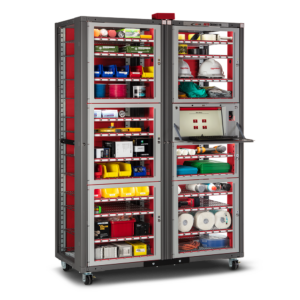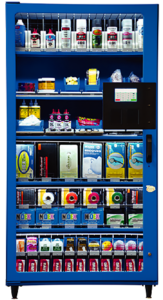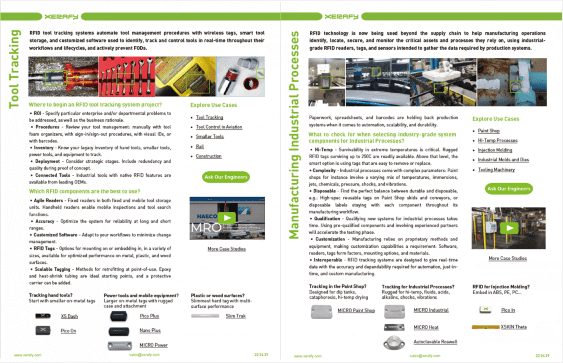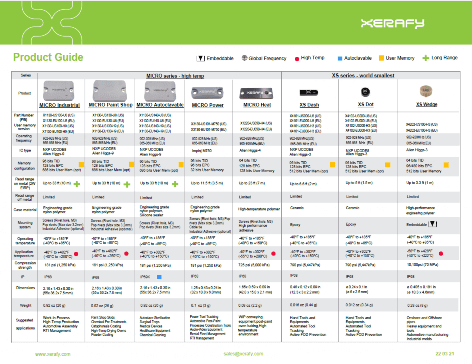RFID in Supply Chains
RFID helps run complex supply chains and take care of critical inventory by enabling end-to-end, real-time visibility across all modes, suppliers, and distributors.
Complex supply chains have a high degree of interconnectedness and interdependence. RFID technology assists in transforming this complexity into synchronized efficiency.
Supply chains face significant challenges such as ensuring proper visibility, guaranteeing quality and safety, and coordinating efficient operations.
RFID offers field-proven solutions to enable end-to-end visibility, speedier operations, and data-driven insights. In addressing these challenges, the technology helps deliver greater efficiency, resilience, and sustainability.
Inventory
Tagging
Monitoring
Inventory
Consignment inventory involves suppliers placing their goods in a buyer’s location until they are consumed or sold. RFID plays a crucial role in enhancing the management of consignment inventory.
RAIN RFID offers significant advantages in streamlining shipment verification and supply chain automation. By RFID labeling each consigned item, real-time visibility is achieved, enabling accurate monitoring of inventory levels for both suppliers and buyers.
This level of visibility is crucial in reducing the risk of stockouts and overstocking while improving overall inventory management.
RFID-enabled consignment inventory systems provide a seamless way to track usage, automate reordering processes, and ensure that both parties clearly understand the charging status.
Tagging
With source tagging, products are RFID labeled at the point of manufacture or packaging.
One key aspect of RAIN RFID technology is source tagging. This approach involves RFID labeling products at the point of manufacture or packaging, ensuring seamless tracking from origin to end-user.
By implementing source tagging using RFID, businesses benefit from automated data capture, enhanced accuracy in inventory counts, and reduced labor costs associated with manual tagging.
Retailers, for instance, can receive goods with RFID labels already in place, enabling faster and more accurate inventory reconciliation and shelf replenishment. This innovation optimizes supply chain operations, minimizes errors, and enhances customer experiences through smoother stock availability and purchasing processes.
Monitoring
Cold chain monitoring is critical to product integrity in industries such as pharmaceuticals and food.
RAIN RFID offers additional functionalities that contribute to supply chain automation. For instance, RFID temperature sensors can be attached to shipments, enabling continuous monitoring of temperature throughout the journey.
These sensors promptly trigger alerts in the event of temperature deviations, allowing timely corrective actions to prevent spoilage or degradation. Real-time visibility into temperature conditions ensures that products remain within the specified range, guaranteeing their quality and safety.
RFID-driven cold chain monitoring prevents costly losses and ensures compliance with regulatory requirements, making it an indispensable tool for industries where temperature control is paramount.
Impact of RFID in Supply Chains
+30% Forecasting Accuracy
Demand forecasting for more accurate inventory planning and reduced excess stock.
-40% Carrying Costs
Just-in-time replenishment with RFID, while maintaining required stock levels.
-95% Reduction in Counterfeiting
RFID-enabled authentication and anti-counterfeiting.
What are RFID vending machines?
RFID vending machines are automated systems that incorporate RFID technology to streamline and enhance the vending experience. These machines utilize RFID tags and labels to enable secure transactions and provide real-time inventory tracking.
In healthcare for instance, vending machines are deployed by medical device manufacturers to securely distribute medical supplies and equipment, ensuring accurate charging inventory management with their hospital customers.


Vending machines have also gained traction in manufacturing as a means to efficiently manage and distribute tools and equipment.
One such example is Fastenal, a supplier of industrial and construction supplies, which offers RFID-equipped vending solutions. These machines allow employees to access tools and supplies by scanning their RFID badges, ensuring accountability and real-time tracking of usage. Another example is AutoCrib, a provider of automated inventory management systems.
Their RFID-enabled vending machines cater to manufacturing and industrial facilities, offering controlled access to tools, parts, and consumables. These solutions not only improve tool availability and reduce downtime but also provide data insights that drive informed inventory management decisions in industrial settings.
What are RFID mandates?
RFID mandates refer to regulations or requirements set by industries, governments, or organizations that dictate the use of RFID technology for specific purposes such as inventory management, traceability, or security.
In the retail industry, major retailers like Walmart and Target have implemented RFID labeling mandates for their suppliers, demanding the use of RFID tags on products to enhance inventory accuracy and streamline supply chains.
In the pharmaceutical sector, the FDA has encouraged the use of RFID technology to improve the tracking and authentication of prescription drugs, ensuring patient safety.
Additionally, the aviation industry has seen mandates for RFID tagging on critical components.
These examples underscore how RFID mandates drive the adoption of technology to achieve efficiency, transparency, and compliance in various industries.
What are supply chain management systems?
Supply chain management systems are sophisticated software platforms designed to orchestrate and optimize the various processes, activities, and resources involved in the entire supply chain lifecycle, from procurement to distribution: SAP Integrated Business Planning for Supply Chain, McKesson SupplyManager for healthcare organizations, Oracle SCM Cloud, etc.
These examples showcase how supply chain management systems revolutionize industries by providing data-driven insights, streamlined processes, and improved collaboration among stakeholders.
What are the benefits of using RFID compared to barcodes?
Barcodes play a crucial role in numerous industries. However, RFID offers several advantages over barcodes.
One major benefit of RFID technology is automated data capture, which improves accuracy in inventory counts and reduces labor costs associated with manual barcoding. With RFID labeling, each item in the supply chain receives a unique identifier that allows for the determination of its location, contents, authenticity, and direction of movement. RFID readers, installed on conveyors or doorways, wirelessly identify goods and containers as they move through facilities. This real-time visibility enables supply chain operators to streamline processes and make data-driven decisions for greater efficiency.
Unlike barcodes, RFID eliminates the need for line-of-sight scans. Employees can simply use RFID readers to verify the contents of a shipment without opening the container and manually scanning each item. This not only saves time but also reduces the risk of errors and damage to goods during handling.
Moreover, RFID-enabled systems provide greater visibility, speedier operations, and valuable insights. RFID technology’s real-time tracking and automated data capture capabilities enable supply chain operators to have up-to-date information on the location and status of their inventory. This facilitates proactive decision-making, reduces delays, and improves overall responsiveness. Additionally, the accuracy and efficiency of RFID contribute to cost-effectiveness in supply chain management, allowing businesses to optimize resources and minimize waste.
Which other technologies are used in supply chain management?
Complex supply chains often utilize RFID in combination with other identification and tracking technologies to enhance visibility and efficiency:
- QR codes are commonly used in the automotive industry for parts and vehicle traceability. Companies like Tesla utilize QR codes on components, enabling quick access to production data.
- GPS tracking systems are extensively used in the logistics industry, with companies like UPS employing them to monitor the real-time location of shipments.
- Blockchain technology is gaining traction, particularly in the food industry. Walmart’s “Food Traceability Initiative” uses blockchain to track the journey of produce, ensuring transparency and food safety.
These technologies, alongside RFID, exemplify the diverse range of tools employed in complex supply chains to achieve accuracy, security, and streamlined operations.


